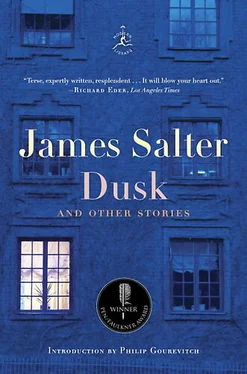“Do you like it?” he asked. “Come on, I’ll buy it for you.”
He wanted to see the coat in the window, he told them inside.
“For the signorina?”
“Yes.”
She seemed uncomprehending. Her face was lost in the fur. He touched her cheek through it.
“You know how much that is?” Alan said. “Four million five hundred thousand.”
“Do you like it?” Frank asked her.
She wore it continually. She watched the football matches on television in it, her legs curled beneath her. The room was in disorder, they hadn’t been out all day.
“What do you say to leaving here?” Alan asked unexpectedly. The announcers were shouting in Italian. “I thought I’d like to see Spoleto.”
“Sure. Where is it?” Frank said. He had his hand on her knee and was rubbing it with the barest movement, as one might a dozing cat.
The countryside was flat and misty. They were leaving the past behind them, unwashed glasses, towels on the bathroom floor. There was a stain on his lapel, Frank noticed in the dining room. He tried to get it off as the headwaiter grated fresh Parmesan over each plate. He dipped the corner of his napkin in water and rubbed the spot. The table was near the doorway, visible from the desk. Eda was fixing an earring.
“Cover it with your napkin,” Alan told him.
“Here, get this off, will you?” he asked Eda.
She scratched at it quickly with her fingernail.
“What am I going to do without her?” Frank said.
“What do you mean, without her?”
“So this is Spoleto,” he said. The spot was gone. “Let’s have some more wine.” He called the waiter. “Senta . Tell him,” he said to Eda.
They laughed and talked about old times, the days when they were getting eight hundred dollars a week and working ten, twelve hours a day. They remembered Weyland and the veins in his nose. The word he always used was “vivid,” testimony a bit too vivid, far too vivid, a rather vivid decor.
They left talking loudly. Eda was close between them in her huge coat. “Alla rovina,” the clerk at the front desk muttered as they reached the street, “alle macerie,” he said, the girl at the switchboard looked over at him, “ alla polvere.” It was something about rubbish and dust.
The mornings grew cold. In the garden there were leaves piled against the table legs. Alan sat alone in the bar. A waitress, the one with the mole on her lip, came in and began to work the coffee machine. Frank came down. He had an overcoat across his shoulders. In his shirt without a tie he looked like a rich patient in some hospital. He looked like a man who owned a produce business and had been playing cards all night.
“So, what do you think?” Alan said.
Frank sat down. “Beautiful day,” he commented. “Maybe we ought to go somewhere.”
In the room, perhaps in the entire hotel, their voices were the only sound, irregular and low, like the soft strokes of someone sweeping. One muted sound, then another.
“Where’s Eda?”
“She’s taking a bath.”
“I thought I’d say good-bye to her.”
“Why? What’s wrong?”
“I think I’m going home.”
“What happened?” Frank said.
Alan could see himself in the mirror behind the bar, his sandy hair. He looked pale somehow, nonexistent. “Nothing happened,” he said. She had come into the bar and was sitting at the other end of the room. He felt a tightness in his chest. “Europe depresses me.”
Frank was looking at him. “Is it Eda?”
“No. I don’t know.” It seemed terribly quiet. Alan put his hands in his lap. They were trembling.
“Is that all it is? We can share her,” Frank said.
“What do you mean?” He was too nervous to say it right. He stole a glance at Eda. She was looking at something outside in the garden.
“Eda,” Frank called, “do you want something to drink? Cosa vuoi? ” He made a motion of glass raised to the mouth. In college he had been a great favorite. Shuford had been shortened to Shuf and then Shoes. He had run in the Penn Relays. His mother could trace her family back for six generations.
“Orange juice,” she said.
They sat there talking quietly. That was often the case, Eda had noticed. They talked about business or things in New York.
When they came back to the hotel that night, Frank explained it. She understood in an instant. No. She shook her head. Alan was sitting alone in the bar. He was drinking some kind of sweet liqueur. It wouldn’t happen, he knew. It didn’t matter anyway. Still, he felt shamed. The hotel above his head, its corridors and quiet rooms, what else were they for?
Frank and Eda came in. He managed to turn to them. She seemed impassive—he could not tell. What was this he was drinking, he finally asked? She didn’t understand the question. He saw Frank nod once slightly, as if in agreement. They were like thieves.
In the morning the first light was blue on the window glass. There was the sound of rain. It was leaves blowing in the garden, shifting across the gravel. Alan slipped from the bed to fasten the loose shutter. Below, half hidden in the hedges, a statue gleamed white. The few parked cars shone faintly. She was asleep, the soft, heavy pillow beneath her head. He was afraid to wake her. “Eda,” he whispered, “Eda.”
Her eyes opened a bit and closed. She was young and could stay asleep. He was afraid to touch her. She was unhappy, he knew, her bare neck, her hair, things he could not see. It would be a while before they were used to it. He didn’t know what to do. Apart from that, it was perfect. It was the most natural thing in the world. He would buy her something himself, something beautiful.
In the bathroom he lingered at the window. He was thinking of the first day they had come to work at Weyland, Braun—he and Frank. They would become inseparable. Autumn in the gardens of the Veneto. It was barely dawn. He would always remember meeting Frank. He couldn’t have done these things himself. A young man in a cap suddenly came out of a doorway below. He crossed the driveway and jumped onto a motorbike. The engine started, a faint blur. The headlight appeared and off he went, delivery basket in back. He was going to get the rolls for breakfast. His life was simple. The air was pure and cool. He was part of that great, unchanging order of those who live by wages, whose world is unlit and who do not realize what is above.
Mrs. Pence and her white shoes were gone. She had left two days before, and the room at the top of the stairs was empty, cosmetics no longer littering the dresser, the ironing board finally taken down. Only a few scattered hairpins and a dusting of talcum remained. The next day Truus came with two suitcases and splotched cheeks. It was March and cold. Christopher met her in the kitchen as if by accident. “Do you shoot people?” he asked.
She was Dutch and had no work permit, it turned out. The house was a mess. “I can pay you $135 a week,” Gloria told her.
Christopher didn’t like her at first, but soon the dishes piled on the counter were washed and put away, the floor was swept, and things were more or less returned to order—the cleaning girl came only once a week. Truus was slow but diligent. She did the laundry, which Mrs. Pence who was a registered nurse had always refused to do, shopped, cooked meals, and took care of Christopher. She was a hard worker, nineteen, and in sulky bloom. Gloria sent her to Elizabeth Arden’s in Southampton to get her complexion cleared up and gave her Mondays and one night a week off.
Gradually Truus learned about things. The house, which was a large, converted carriage house, was rented. Gloria, who was twenty-nine, liked to sleep late, and burned spots sometimes appeared in the living room rug. Christopher’s father lived in California, and Gloria had a boyfriend named Ned. “That son of a bitch,” she often said, “might as well forget about seeing Christopher again until he pays me what he owes me.”
Читать дальше












